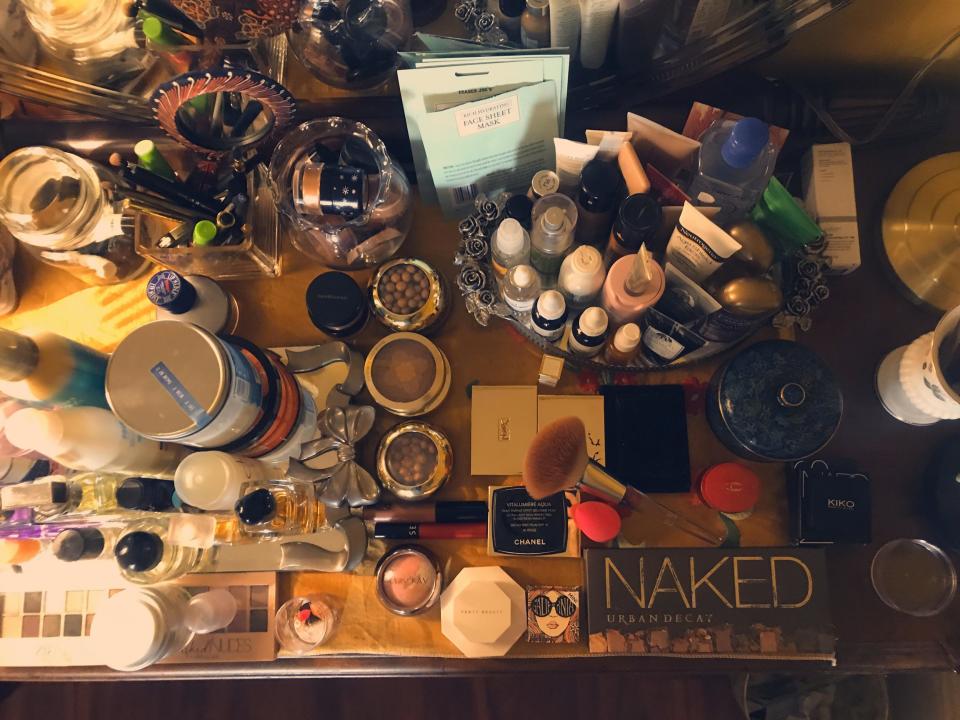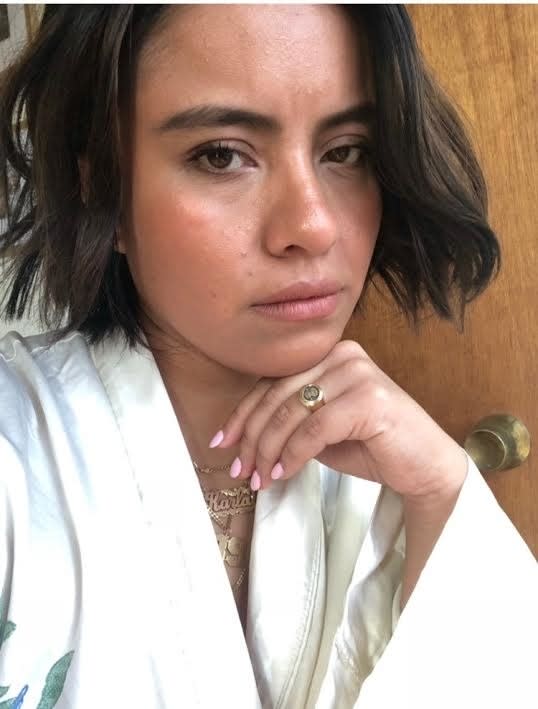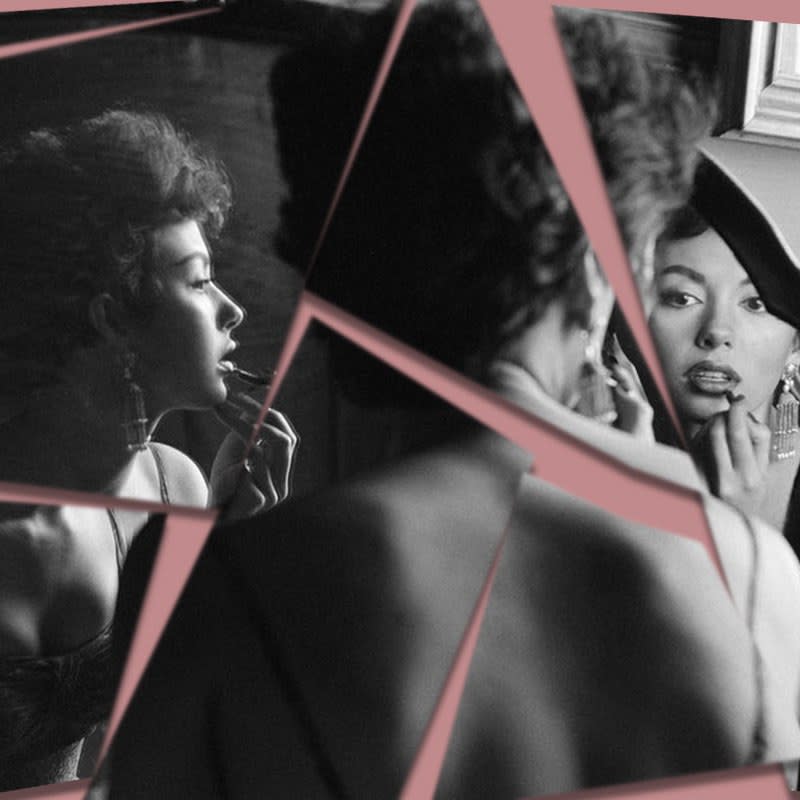I'm an Immigrant. When I Spend Money on Makeup, I'm Paying to Feel Safe.
I grew up poor. Not broke, which isn’t poor, and not bohemian poor, like a gentrifier living in the ghetto but able to afford nice clothes. Undocumented-child-of-undocumented-immigrants poor, which means that even as I worked to g degrees from Harvard and Yale, delivering the American Dream at my parents’ feet, my mother and father are in a perpetual, worsening state of poverty because they are aging out of manual labor in a country that is trying to expel them. They’ve paid their taxes for decades but haven’t been able to put a penny towards their retirement. They do not qualify for public benefits. That kind of poor.
For my family poverty is like walking in a hurricane. I spend my money buying my parents umbrella after umbrella; each provides some relief, then breaks—cheap fixes, all of them. The rain has paused for now. But it will resume. In Spanish, we call that pause escampo. The rain has escampado. I have some discretionary income. Most of that goes towards my family, my reporting, or towards immigrants in my community who need it. It will not last forever.
But about a year ago, a curious thing happened. I walked into a Sephora and realized I could buy whatever I wanted.
I walked right out. That didn’t feel right. Later I went back in to Sephora with my mother and I told her I would buy her whatever she wanted. That felt better. She has studied fashion magazines since she was a kid in Ecuador and had her wishlist: Nars Blush in Orgasm. YSL Touche Éclat Radiance Awakening Foundation. A tube of Rouge Dior lipstick in deep red. A bottle of Byredo "Rose Noir" Eau de Parfum that Sephora didn’t have in stock. And on and on.
Up until that point, she had owned drugstore products. My mother was emotional and cleared her dresser bureau to organize the new makeup. The Chanel shadows never left their velvet sleeves with their trademark hot-stamped logo. I think she used her fingers to smudge on the shimmers not to maximize pigment, but because she didn’t want to stain the tiny applicators. The Byredo perfume would be spritzed twice (just twice) whenever she went to a graduation or a funeral. She never even removed the BeautyBlender from its plastic case to keep it clean. She kept purchasing drugstore bronzers so she wouldn’t have to deplete the Bare Minerals one I got her, the same one I use. It’s called “A Little Sun” and it’s golden brown with a slight red tint. I've never gone on a vacation, but I always liked the way white girls at Harvard looked in September after they’d spent weekends biking through the Cape.
For my mother, a top shelf is a magical cloud of luxury, a delicious feel-good fantasy.
My mother and I had disagreements about it. I could see that she rarely used her makeup, reserving it for special occasions or for church. Weeks passed, and she continued to venture into Manhattan barefaced. I panicked and pleaded with her to wear it whenever she encountered white people who determined her life or livelihood, like at work or at the doctor’s office. I asked her to wear a full face of makeup whenever I was not with her to serve as her interpreter, whenever my credit card could not communicate in a demented shorthand that we are human too. But she wouldn’t listen. For my mother, a top shelf is a magical cloud of luxury, a delicious feel-good fantasy.
But my mother doesn’t read the news in order to preserve her sanity and I have to for my job—I’m an immigration writer—so she doesn’t know about the Border Patrol agents who dump gallons of water that humanitarian groups have left in the desert for migrants. I do. For me, as a formerly undocumented young woman and the daughter of undocumented immigrants, makeup has become a talisman—an attempt to ward off evil.

I didn’t learn to use makeup from my mother, as I know many young women do. Growing up, my Latinx immigrant family followed strict traditional gender roles where my dad worked out in the world and my mom stayed home with me and my brother. My father had expectations when he came home from work—dinner, a clean house, the usual. But he also expected my mother to look beautiful. He expected her to do the work with her hair down, makeup on, in heels. Instead, she wore sweats, sunscreen, and her hair in a bun. I admired that about her, even when it ended in a fight. My mother made it clear she’d never wear makeup for a man.
Like she had, I learned about makeup from magazines, where the beautiful models and celebrities were mostly white. It wasn’t until Jay-Z said, “Put some colored girls in the MoMa” in 2011 that I stopped wanting to look like a French gamine. Jackie Aina on YouTube came to me like a revelation. I watched her videos and learned how to address hyperpigmentation, color correction, and a status quo that doesn’t want to cater to dark skin. It took a gorgeous black makeup artist who had been through hell and back to make me understand what it could mean to talk about makeup in terms of self care. Her looks were radical acts—declarations of delight and exuberance.
My mother is beautiful. Sometimes I attempt to conjure up what a racist person might see if he looked at her at her most glamorous and regal, with her fig-brown skin and a caravan nose straight out of a Renaissance portrait. I think about the tear-gassed toddlers on the border, their parents desperate for asylum. I wonder if he processes her as human.
I can’t protect my mother from getting fired from her job, or detention, or deportation. I can’t even protect her from daily encounters with racist abuse. But I can use the master’s own tools to prepare her to step into the master’s house.
I understand this is twisted.
I think a lot about an experiment I read about in Scientific American in which black and white participants in a mall were asked to determine how much to spend on a pair of expensive headphones. Half of the black participants were first made to review a list of racist traits associated with African-Americans. Afterwards, when the participants were shown photographs of the headphones, the individuals who had been forced to read the list offered to pay a lot more money than either the white participants or the black participants who hadn’t had to confront those stereotypes.

I pay for nice makeup because I want to prove that I can—once a saleswoman at a department store asked too pointedly if I needed help and I ended up buying two Chanel lipsticks and a blush that I didn’t need—and because maybe it’ll make someone think twice before they assume who my mother and I are based on the color of our skin.
Earlier this fall, I bought the Tom Ford Shade and Illuminate. It costs $85, what my father earns for a full day of work as a salad maker. But the packaging is gorgeous. It contours and highlights, and I like to sweep it over Sonia Kashuk Undetectable Crème Bronzer to deepen my brown skin. A good dupe for it is the Wet n Wild MegaGlo Makeup Stick, which retails for $3.99. I use both. The truth is I like the Wet n Wild one even better because it’s dispensed in a stick, so I don’t need to use a brush, and the color is warmer.
But when I have to go into spaces where I know I will feel intimidated because of my race or when I have to talk to powerful white people whom I know do not see me as an equal—even if it’s on the phone, even if I’m just in a towel, right out of the shower, even if I have to drink a vodka soda to muster up the courage to voice my opinion—I wear a full face of makeup and every cream and powder that touches my skin is designer. YSL, Dior, Chanel, Tom Ford. My armor.
I feel beautiful when I am able to grit my teeth and get it done, when I can bite the inside of my cheeks and not cry, when I can show off a steely face to the world. Makeup helps me do that.
Some more enlightened women than I will tell me they feel beautiful when they are surrounded by the people they love, when they drink a lot of water, when they spend time with their children. I feel beautiful when I am able to grit my teeth and get it done, when I can bite the inside of my cheeks and not cry, when I can show off a steely face to the world. Makeup helps me do that.
I have nightmares about deportation and internment camps every night. But sometimes when I can’t fall asleep, I fantasize about meeting the President of the United States and I feel a surge of warm pleasure as I imagine step-by-step how I’d prepare. I’d line my lips in red liner then fill them in with multiple coats of MAC in Russian Red. Long, curled lashes coated in Too Faced Better Than Sex Mascara. If I needed to cry, I’d cry in the bathroom, silently. The formula is waterproof, so I’d be able to hide the evidence.
Makeup makes me feel beautiful and it makes me feel powerful, but it doesn't make me feel like a pretty girl. Makeup makes me feel like a woman with a plan for survival. I don’t play with makeup. I unleash it.
Karla Cornejo Villavicencio is a writer living in New Haven, Connecticut. She is an Emerson Collective Fellow. You can follow her on Instagram @kcornv.
Main Photo: Getty Images


